I have multiple category columns (nearly 50). I using custom made frequency encoding and using it on training data. At last i am saving it as nested dictionary. For the test data I am using map function to encode and unseen labels are replaced with 0. But I need more efficient way?
I have already tried pandas replace method but it don't cares of unseen labels and leaves it as it. Further I am much concerned about the time and i want say 80 columns and 1 row to be encoded within 60 ms. Just need the most efficient way I can do it. I have taken my example from here.
import pandas
from sklearn import preprocessing
df = pandas.DataFrame({'pets': ['cat', 'dog', 'cat', 'monkey', 'dog', 'meo'],
'owner': ['Champ', 'Ron', 'Brick', 'Champ', 'Veronica', 'Ron'],
'location': ['San_Diego', 'New_York', 'New_York', 'San_Diego', 'San_Diego',
'New_York']})
My dict looks something like this :
enc = {'pets': {'cat': 0, 'dog': 1, 'monkey': 2},
'owner': {'Brick': 0, 'Champ': 1, 'Ron': 2, 'Veronica': 3},
'location': {'New_York': 0, 'San_Diego': 1}}
for col in enc:
if col in input_df.columns:
input_df[col]= input_df[col].map(dict_online['encoding'][col]).fillna(0)
Further I want multiple columns to be encoded at once. I don't want any loop for every column.... I guess we cant do it in map. Hence replace is good choice but in that as said it doesn't cares about unseen labels.
EDIT:
This the code i am using for now, Please note there is only 1 row in test data frame ( Not very sure i should handle it like numpy array to reduce time...). But i need to decrease this time to under 60 ms: Further i have dictionary only for mapping ( Cant use one hot because of use case). Currently time = 331.74 ms. Any idea how to do it more efficiently. Not sure that multiprocessing will work..? Further with replace method i have got many issues like : 1. It does not handle unseen labels and leave them as it is ( for string its issue). 2. It has problem with overlapping of keys and values.
from string import ascii_lowercase
import itertools
import pandas as pd
import numpy as np
import time
def iter_all_strings():
for size in itertools.count(1):
for s in itertools.product(ascii_lowercase, repeat=size):
yield "".join(s)
l = []
for s in iter_all_strings():
l.append(s)
if s == 'gr':
break
columns = l
df = pd.DataFrame(columns=columns)
for col in df.columns:
df[col] = np.random.randint(1, 4000, 3000)
transform_dict = {}
for col in df.columns:
cats = pd.Categorical(df[col]).categories
d = {}
for i, cat in enumerate(cats):
d[cat] = i
transform_dict[col] = d
print(f"The length of the dictionary is {len(transform_dict)}")
# Creating another test data frame
df2 = pd.DataFrame(columns=columns)
for col in df2.columns:
df2[col] = np.random.randint(1, 4000, 1)
print(f"The shape of teh 2nd data frame is {df2.shape}")
t1 = time.time()
for col in df2.columns:
df2[col] = df2[col].map(transform_dict[col]).fillna(0)
print(f"Time taken is {time.time() - t1}")
# print(df)
